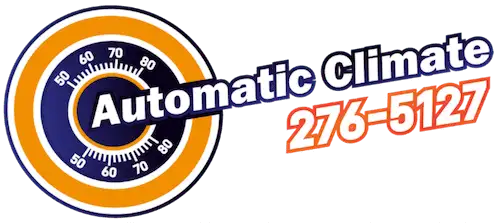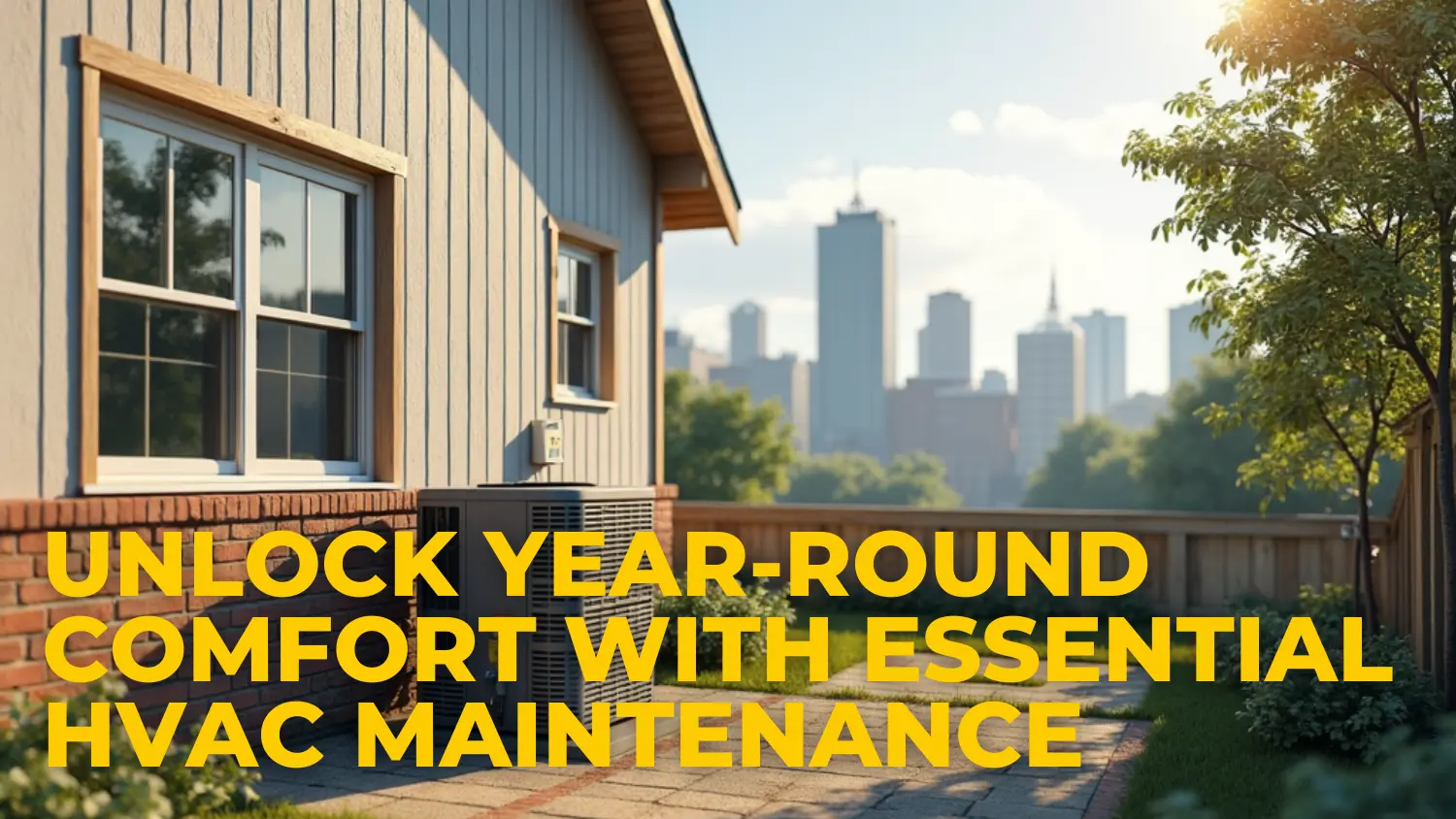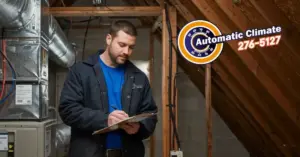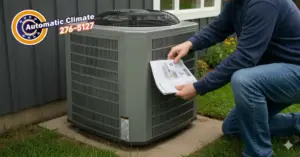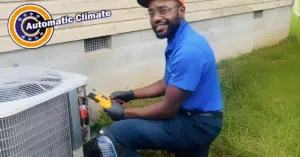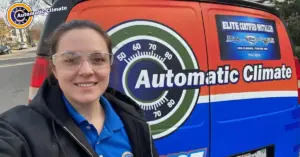10 Essential HVAC Maintenance Tasks Every Homeowner Should Know
Performing essential HVAC maintenance tasks is crucial for every homeowner. Your Heating, Ventilation, and Air Conditioning (HVAC) system is the heart of your home’s comfort, working tirelessly behind the scenes to keep you cool in the summer and warm in the winter. But like any hardworking machine, it needs regular care to function efficiently, safely, and reliably. Neglecting these vital checks can lead to decreased performance, higher energy bills, unexpected breakdowns, and even shortened equipment lifespan. Many homeowners overlook these simple yet critical steps, assuming their system will run forever without a hitch. However, proactive care is key.
At Automatic Climate HVAC & Air Conditioning, serving the Richmond, VA area since 1983, we’ve seen firsthand the difference regular upkeep makes. Understanding and performing these 10
essential HVAC maintenance tasks can save you discomfort, time, and significant expense down the road. Some of these tasks are simple DIY jobs, while others are best left to trained professionals. Knowing which is which is just as important. Let’s dive into the essential HVAC maintenance tasks that will keep your system in top shape, ensuring year-round comfort for you and your family. Remember, a little prevention goes a long way in protecting your investment and maintaining a comfortable home environment. Prioritizing these essential HVAC maintenance tasks is not just about upkeep; it’s about smart homeownership.
“An ounce of prevention is worth a pound of cure.”
– Benjamin Franklin
1. Replace or Clean Air Filters Regularly
This is arguably the most critical and easiest of the essential HVAC maintenance tasks you can perform yourself. Your system’s air filter traps dust, pollen, pet dander, and other airborne particles, preventing them from circulating in your home and clogging the HVAC components. A dirty, clogged filter severely restricts airflow. This forces your furnace or air handler to work much harder to push air through, leading to increased energy consumption and unnecessary strain on components like the fan motor. Reduced airflow also means less efficient heating and cooling, potentially creating hot or cold spots in your home.
How often should you change your filter? The general recommendation is every 1-3 months. However, this frequency depends on several factors:
- Pets: Homes with furry friends usually require more frequent changes (monthly).
- Allergies/Asthma: If anyone in the household suffers from respiratory issues, monthly changes are advisable.
- System Usage: During peak heating and cooling seasons when the system runs constantly, check the filter monthly.
- Filter Type: Basic fiberglass filters may need monthly replacement, while higher-efficiency pleated filters (like those with higher MERV ratings) might last up to three months. According to the EPA, filters with MERV ratings between 7 and 13 are effective at removing smaller, health-concerning particles. Always check the manufacturer’s recommendation and inspect the filter visually. If it looks dirty, change it, regardless of the timeframe. Performing this simple step is a cornerstone of effective essential HVAC maintenance tasks and directly impacts your indoor air quality. Neglecting this is one of the top causes of HVAC system failure.
Remember, consistent filter changes are fundamental essential HVAC maintenance tasks for efficiency and longevity.
Take advantage of our latest promotions and save on HVAC services. Whether you need a new installation, repair, or maintenance, we have special offers just for you!
2. Clean Around the Outdoor Unit (Condenser/Heat Pump)
Your outdoor unit, whether it’s an air conditioner condenser or a heat pump, needs clear space to operate efficiently. Its job is to release heat absorbed from inside your home (in cooling mode) or absorb heat from the outside air (in heating mode for heat pumps). This heat exchange happens via the condenser coil and fins surrounding the unit. Leaves, grass clippings, dirt, dust, falling twigs, and encroaching vegetation can block airflow through these coils. Just like a clogged filter inside, blocked airflow outside forces the system to work harder, consume more energy, and can lead to overheating or component failure.
Make it a regular habit – perhaps monthly during high-use seasons – to inspect the area around your outdoor unit. Clear away any debris accumulated on or near the unit. Trim back bushes, shrubs, or tall grass to maintain at least two feet of clearance on all sides and above the unit. Gently hose down the exterior fins with a garden hose (ensure power is turned off first!) to remove dirt and dust. Be careful not to bend the delicate aluminum fins; if they are bent, airflow is restricted. A professional technician can straighten them using a fin comb during a tune-up. Keeping the outdoor unit clear is one of the essential HVAC maintenance tasks that directly impacts cooling efficiency and prevents strain. Don’t underestimate the importance of this outdoor essential HVAC maintenance task.
3. Check and Clear the Condensate Drain Line
During the cooling process (and with high-efficiency furnaces), your HVAC system removes moisture (humidity) from the air. This moisture collects in a drain pan and flows out through a condensate drain line, usually a PVC pipe leading outside or to a floor drain. Over time, algae, mold, sludge, and debris can build up inside this line, causing a clog. A clogged drain line is a common issue and a critical one to address among the essential HVAC maintenance tasks.
If the line clogs, water backs up into the drain pan. If the pan overflows, it can cause significant water damage to your home (ceilings, walls, floors) and potentially damage HVAC components. Excess moisture can also promote mold growth within your system and home. Many modern systems have a safety float switch that shuts down the AC if water backs up, preventing damage but leaving you without cooling. Periodically inspect the drain line exit point to ensure water is dripping out when the AC runs. You can help keep it clear by pouring a mixture of distilled vinegar (about a cup) down the drain line access point (often a T-fitting near the indoor unit) every few months, especially before and during the cooling season. Some professionals recommend specific tablets or solutions. If you suspect a clog or see water pooling, it might require clearing with a wet/dry vacuum or specialized tools – often best handled during a professional
AC tune-up. Ensuring a clear drain line is one of the most vital essential HVAC maintenance tasks to prevent costly water damage.
Quick Guide: Top 3 DIY HVAC Tasks
Change Filters
Replace every 1-3 months for optimal airflow, efficiency, and air quality. This is a key essential HVAC maintenance task.
Clean Outdoor Unit
Keep area clear (2ft radius). Gently hose off fins. Prevents overheating and improves efficiency. Another essential HVAC maintenance task.
Clear Drain Line
Check for clogs. Use vinegar periodically. Prevents water damage and system shutdowns. Don’t skip this essential HVAC maintenance task.
4. Inspect Wiring and Electrical Connections
This task edges into the territory where professional help is strongly recommended due to safety risks, but homeowner awareness is key. Your HVAC system relies on numerous electrical connections, wires, capacitors, and contactors. Over time, vibrations, power surges, or simple wear and tear can cause wires to fray, connections to loosen, or components to fail. Faulty electrical connections are not just efficiency issues; they are serious safety hazards that can lead to system failure, damage to major components, or even electrical fires.
While a homeowner might visually inspect accessible wiring for obvious signs of damage (like burn marks or frayed insulation) **with the power completely shut off at the breaker box**, tightening connections, measuring voltage/current, and testing capacitors should only be done by a qualified technician. Include a check of electrical components in your annual professional maintenance schedule. This is one of the essential HVAC maintenance tasks where professional expertise is paramount for safety and proper diagnosis. Think of this part of essential HVAC maintenance tasks as crucial for preventing major hazards. If you ever suspect an electrical issue (flickering lights when the system starts, burning smells, frequent breaker trips), call a professional immediately for
heating repair or AC service.
5. Check Thermostat Functionality
Your thermostat is the brain of your HVAC system, telling it when to turn on, turn off, and what temperature to maintain. If the thermostat isn’t functioning correctly, your system won’t operate efficiently, and your comfort will suffer. Periodically test your thermostat to ensure it’s accurately reading the room temperature and properly signaling the heating and cooling cycles. Check that the settings are appropriate for the season and your schedule. If you have an older manual thermostat, consider upgrading to a programmable or smart thermostat. These allow you to set temperature schedules based on when you’re home or away, significantly reducing energy waste. An ENERGY STAR certified smart thermostat can save homeowners approximately $100 per year.
If your thermostat is battery-powered, replace the batteries annually (or when the low battery indicator appears) to prevent unexpected system shutdowns. Ensure the thermostat is level on the wall and free from dust buildup inside the cover (turn off power before cleaning). Verifying thermostat accuracy is a simple but essential HVAC maintenance task for both comfort and energy savings. Accurate control is central to the purpose of essential HVAC maintenance tasks.
“Details make perfection, and perfection is not a detail.”
– Leonardo da Vinci (Applied to the thoroughness needed for HVAC care)
HVAC Maintenance Schedule & Tips Overview
Task Category
Frequency
Typical Method
Key Benefit
Filter Change/Cleaning
Monthly to Quarterly
DIY
Airflow, Efficiency, IAQ
Outdoor Unit Cleaning
Monthly Check, Seasonal Clean
DIY
Efficiency, Prevent Strain
Condensate Drain Check
Quarterly Check/Flush
DIY (Flush) / Pro (Clog)
Prevent Water Damage
Electrical Insp.
Annually
Professional
Safety, Prevent Failure
Thermostat Check
Seasonally / Annually (Batt)
DIY
Accuracy, Efficiency
Full System Tune-Up
Annually (Spring & Fall Recommended)
Professional
Overall Health, Efficiency, Longevity
Source: Combined insights from
Department of Energy and industry best practices. Performing these essential HVAC maintenance tasks is key.
6. Lubricate Motors and Bearings (If Applicable)
Older HVAC systems sometimes have motors (like the blower motor or condenser fan motor) with ports for lubrication. Proper lubrication reduces friction, which decreases electricity usage and prevents the motor from overheating and wearing out prematurely. However, many modern HVAC motors have sealed bearings that don’t require lubrication. Check your owner’s manual to see if your system’s motors need lubrication and what type of lubricant to use (using the wrong kind can cause damage).
If lubrication is required, this is often included as part of a professional annual tune-up. Technicians know where to find the ports (if they exist) and use the correct oil. Over-lubricating can be just as harmful as under-lubricating. Due to the specifics involved, unless you are very familiar with your system and the manual specifies DIY lubrication, it’s generally best to leave this essential HVAC maintenance task to the pros during
heating maintenance or AC checks. Proper lubrication is one of the essential HVAC maintenance tasks that ensures mechanical longevity.
7. Inspect Fan Blades and Motor (Indoor Blower & Outdoor Condenser)
Your HVAC system has two critical fans: the indoor blower fan (part of the furnace or air handler) that circulates conditioned air through your ducts, and the outdoor condenser fan that pulls air through the condenser coil. The blades on both fans should be clean and free of damage (chips, cracks). Dirty blades can become unbalanced, leading to noise, reduced efficiency, and extra strain on the fan motor. Fan motors themselves should be checked for wear and proper operation.
Visually inspect the accessible fan blades (power off!). The outdoor fan is easy to see; the indoor blower might require removing an access panel (again, power MUST be off). Look for dust buildup or any visible damage. Cleaning fan blades can sometimes be a DIY task if easily accessible, but deep cleaning or addressing motor issues is best left to professionals. This inspection is an important part of the comprehensive list of essential HVAC maintenance tasks. Keeping fans operational is critical; these essential HVAC maintenance tasks ensure proper airflow.
8. Check Refrigerant Levels (Professional Task)
This is one of the essential HVAC maintenance tasks that absolutely requires a certified professional. Air conditioners and heat pumps use refrigerant to transfer heat. If the refrigerant level is too low (usually due to a leak) or too high (due to improper charging), the system will not cool or heat efficiently, will use more energy, and components like the compressor can be damaged. Refrigerant is a controlled substance, and handling it requires special equipment and EPA certification.
Homeowners cannot and should not attempt to check or add refrigerant. However, you can be aware of potential signs of a refrigerant problem, such as:
- Air coming from vents isn’t as cold/warm as usual.
- Ice forming on the refrigerant lines or outdoor unit coils.
- Hissing sounds near the unit.
- Increased energy bills without explanation.
If you notice these signs, schedule a service call. A technician will check the refrigerant pressure, detect and repair leaks if necessary, and charge the system to the manufacturer’s specifications. This check is a standard part of professional essential HVAC maintenance tasks included in an AC clean check inspection. Understanding the need for professional refrigerant checks is part of knowing your essential HVAC maintenance tasks.
Keep Your Comfort Automatic! Schedule Professional Maintenance Today
Don’t wait for a breakdown! Ensure your system runs efficiently and reliably year-round by scheduling professional HVAC maintenance with Automatic Climate. Serving Richmond, VA, and surrounding areas since 1983, our experienced technicians perform comprehensive tune-ups covering all the essential HVAC maintenance tasks that require expert attention. Regular service protects your investment, improves efficiency, and provides peace of mind.
Case Study: The Davis Family’s Comfort Turnaround
Challenge: The Davis family in Richmond experienced inconsistent cooling and rising energy bills. Their AC unit seemed to run constantly but struggled on hot days. They hadn’t scheduled professional maintenance in over three years, only performing occasional filter changes. They weren’t aware of all the essential HVAC maintenance tasks needed.
Solution: An Automatic Climate technician performed a full AC tune-up. The inspection revealed extremely dirty evaporator coils, slightly low refrigerant due to a minor valve leak, and a clogged condensate drain line just beginning to back up. These neglected essential HVAC maintenance tasks were crippling their system.
Result: After thoroughly cleaning the coils, repairing the leak, recharging the refrigerant correctly, and clearing the drain line, the Davis’s AC performance dramatically improved. Their home cooled faster and more evenly, the unit ran less often, and their subsequent energy bills dropped significantly. They signed up for an annual maintenance plan to ensure all essential HVAC maintenance tasks are consistently addressed, ensuring reliable comfort and efficiency.
9. Inspect Ductwork for Leaks and Damage
Your ductwork is the delivery system for conditioned air. Leaks, holes, disconnected sections, or poor insulation in ducts mean that expensive heated or cooled air escapes into unconditioned spaces like attics, crawlspaces, or basements instead of reaching your living areas. According to ENERGY STAR, leaky ducts can reduce heating and cooling system efficiency by as much as 20 percent. This makes your system run longer, wastes energy, and can lead to uneven temperatures and poor indoor air quality.
Visually inspect accessible ductwork runs for obvious signs of damage – disconnected joints, tears in flexible ducting, or streaks of dust around seams indicating leaks. Use mastic sealant or metal-backed foil tape (not standard duct tape, which degrades quickly) to seal leaks effectively. Ensure ducts running through unconditioned spaces are adequately insulated. While some sealing can be DIY, a professional duct inspection can use specialized tools to pinpoint hidden leaks and assess the entire system. Considering professional
air duct cleaning and sealing is a valuable part of long-term essential HVAC maintenance tasks. Addressing duct issues is one of the essential HVAC maintenance tasks with a high return on investment.
10. Test Safety Controls & Perform Seasonal Startup/Shutdown
HVAC systems, especially furnaces, have important safety controls like high limit switches (preventing overheating) and pressure switches. These need to function correctly for safe operation. Testing these controls is typically part of a professional tune-up. Additionally, performing proper seasonal startup and shutdown procedures can help ensure smooth transitions between heating and cooling seasons. This might involve checking furnace ignition in the fall or ensuring the AC starts correctly in the spring after sitting idle.
Homeowners can perform basic startup checks: Turn the system on via the thermostat and listen for unusual noises or smells. Ensure air is flowing from the vents. For furnaces, check the pilot light (if applicable) or listen for the igniter and burners firing up. If anything seems amiss, call for service. Relying on professional checks for safety controls is a non-negotiable aspect of essential HVAC maintenance tasks. Regularly performing these essential HVAC maintenance tasks, both DIY and professional, ensures your system operates safely, efficiently, and reliably for years to come, providing the comfort your family deserves. For peace of mind, trust the pros at Automatic Climate for your comprehensive
heating tune-up and AC checks. Completing all ten essential HVAC maintenance tasks leads to optimal system health.
Frequently Asked Questions About Essential HVAC Maintenance Tasks
1. How often should I schedule professional HVAC maintenance?
It’s highly recommended to have professional maintenance performed twice a year: once in the spring for your cooling system and once in the fall for your heating system. This ensures both systems are ready for peak season demands and addresses many essential HVAC maintenance tasks.
2. What are the main benefits of regular HVAC maintenance?
Benefits include improved energy efficiency (lower bills), extended equipment lifespan, fewer unexpected breakdowns and costly repairs, improved indoor air quality, and safer system operation. Performing essential HVAC maintenance tasks is an investment.
3. Can I perform all essential HVAC maintenance tasks myself?
Some tasks like changing filters, cleaning around the outdoor unit, and basic drain line flushing are typically DIY. However, tasks involving electrical components, refrigerant handling, internal cleaning of coils, and safety control checks require professional training and tools.
4. How much energy can I save with regular maintenance?
Savings vary, but well-maintained systems run more efficiently. ENERGY STAR notes that tasks like sealing ducts can improve efficiency by up to 20%, and clean filters/coils prevent the system from working harder. Consistent essential HVAC maintenance tasks contribute significantly to energy savings.
5. What’s included in a typical professional HVAC tune-up?
A tune-up usually includes cleaning coils, checking refrigerant levels, inspecting electrical connections, lubricating moving parts (if needed), testing safety controls, inspecting the condensate drain, checking thermostat calibration, and overall system performance assessment. It covers many complex essential HVAC maintenance tasks.
6. Why is cleaning the coils (indoor and outdoor) important?
Dirty coils hinder heat transfer. The evaporator coil absorbs heat from indoor air, and the condenser coil releases heat outdoors. Dirt acts as an insulator, reducing efficiency, increasing energy use, and straining the system. Cleaning coils is a vital essential HVAC maintenance task.
7. What happens if I neglect cleaning the condensate drain?
A clogged drain can cause water backup, leading to overflow, water damage to your home, mold growth, and potentially shutting down your AC system via the safety switch. This is one of the essential HVAC maintenance tasks that prevents major headaches.
8. Is changing the air filter really that important?
Absolutely. It’s one of the simplest yet most impactful essential HVAC maintenance tasks. A clogged filter restricts airflow, hurting efficiency, increasing wear and tear, and worsening indoor air quality.
9. How do I know if my ductwork is leaking?
Signs include high utility bills, rooms that are hard to heat or cool, excessive dust, and visible damage like disconnected joints or tears. A professional inspection can confirm and locate leaks. Addressing leaks is an essential HVAC maintenance task for efficiency.
10. Does maintenance help my HVAC system last longer?
Yes. Regular maintenance reduces strain on components, prevents minor issues from becoming major failures, and generally helps the system operate closer to its designed specifications, contributing to a longer operational lifespan. Longevity is a key goal of essential HVAC maintenance tasks.
11. What is “short cycling” and can maintenance prevent it?
Short cycling is when the HVAC system turns on and off frequently without completing a full cycle. It can be caused by issues like restricted airflow (dirty filter/coils), incorrect refrigerant charge, or an oversized system. Regular maintenance, by addressing airflow and refrigerant issues, can help prevent some causes of short cycling. It’s related to essential HVAC maintenance tasks ensuring proper operation.
12. Are maintenance plans or agreements worth it?
Often, yes. Plans like those offered by
Automatic Climate typically include the recommended bi-annual tune-ups, priority service, and sometimes discounts on repairs, ensuring essential HVAC maintenance tasks are consistently performed and potentially saving money long-term.
13. Can skipping maintenance void my HVAC warranty?
Yes, many manufacturer warranties require proof of regular professional maintenance for coverage to remain valid. Neglecting essential HVAC maintenance tasks could lead to denied warranty claims.
14. What safety precautions should I take for DIY tasks?
Always turn off the power to the HVAC unit at the breaker box before performing any cleaning or inspection involving electrical components or moving parts (like fans or motors). Wear gloves and eye protection when needed. This is crucial for safely performing essential HVAC maintenance tasks.
15. My system seems to be working fine, do I still need maintenance?
Yes. Preventive maintenance catches small issues before they cause noticeable problems or breakdowns. Waiting until something is obviously wrong often means a more expensive repair. Performing essential HVAC maintenance tasks proactively is key.
16. How does keeping the area around the outdoor unit clear help?
The outdoor unit needs unrestricted airflow to dissipate heat (AC mode) or absorb heat (heat pump mode). Blockages force the compressor and fan to work harder, reducing efficiency and potentially causing overheating. This simple essential HVAC maintenance task has a big impact.
17. Should I cover my outdoor AC unit in the winter?
Opinions vary. Covering the top can prevent leaves and debris from falling directly in, but fully covering it can trap moisture, potentially leading to corrosion or inviting pests. If you cover it, use a breathable cover designed for AC units, covering only the top. This is a consideration related to seasonal essential HVAC maintenance tasks.
18. What are signs my HVAC system needs immediate repair, not just maintenance?
Loud unusual noises (grinding, squealing), burning smells, frequent cycling on/off, no cool/warm air despite running, visible refrigerant leaks or ice buildup, and water pooling around the unit are signs needing prompt professional attention beyond routine essential HVAC maintenance tasks.
19. Does HVAC maintenance impact indoor air quality?
Yes, significantly. Clean filters trap pollutants, clean coils prevent mold growth, clear drains remove excess moisture that fosters mold, and sealed ducts prevent dirty air from being drawn in. Improving IAQ is a major benefit of consistent essential HVAC maintenance tasks.
20. Where can I find reliable HVAC services in Richmond VA?
Automatic Climate HVAC & Air Conditioning has provided trusted
HVAC services Richmond VA homeowners rely on since 1983. Contact us at (804) 803-1983 for comprehensive maintenance and repairs, ensuring all your essential HVAC maintenance tasks are expertly handled.
Conclusion: Invest in Your Comfort and System Health
Understanding and addressing these 10 essential HVAC maintenance tasks is fundamental to responsible homeownership. From simple DIY steps like changing filters and clearing debris to scheduling crucial professional tune-ups covering electrical safety, refrigerant levels, and internal components, each task plays a role in your system’s performance, efficiency, and longevity. Consistent attention to these essential HVAC maintenance tasks translates directly to more reliable comfort, lower energy bills, cleaner air, and fewer unexpected, costly repairs. Don’t wait for a problem – be proactive about your essential HVAC maintenance tasks.
For homeowners in the Richmond, VA area, Automatic Climate is your partner in maintaining a healthy and efficient HVAC system. With decades of experience since 1983, we provide the expert
HVAC services Richmond VA residents trust. Let us handle the complex essential HVAC maintenance tasks, giving you peace of mind. Contact us today to schedule your next service appointment and keep your home comfortable all year long. Remember, completing these essential HVAC maintenance tasks protects your investment. Every essential HVAC maintenance task matters. Make essential HVAC maintenance tasks a priority.
Additional Resources & External Links
For further reading and official guidelines on HVAC maintenance and energy efficiency, explore these resources:
These resources provide valuable context for understanding the importance of essential HVAC maintenance tasks.
#HVACMaintenance #HomeMaintenance #EnergyEfficiency #RichmondVA #AutomaticClimate #HeatingAndCooling #ACTuneUp #HeatingMaintenance #EssentialHVACMaintenanceTasks #DIYHome #HVACTips #IndoorAirQuality #HVACServicesRichmondVA
Legal Disclaimer: The information provided in this article is for general informational purposes only. While we strive to keep the information up-to-date and correct, we make no representations or warranties of any kind, express or implied, about the completeness, accuracy, reliability, suitability, or availability with respect to the article or the information, products, services, or related graphics contained in the article for any purpose. Any reliance you place on such information is therefore strictly at your own risk. Performing HVAC maintenance involves potential risks, including electrical shock and exposure to moving parts. Always turn off power to the unit before performing any DIY tasks. For tasks requiring technical expertise, refrigerant handling, or dealing with electrical components, consult a qualified HVAC professional like Automatic Climate. Automatic Climate is not liable for any injuries or damages resulting from attempts to perform maintenance tasks described herein. Always follow manufacturer instructions and safety precautions.
